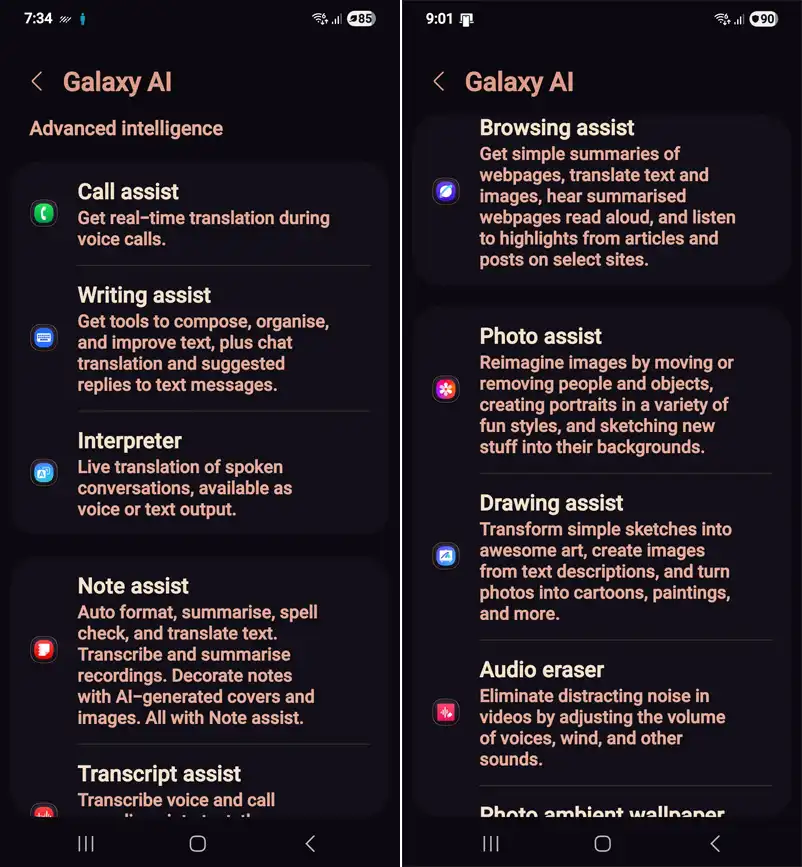My curiosity about the much-hyped Galaxy AI features initially drew me to the Galaxy S24 Ultra. I spent the first week eagerly exploring its various AI tools and was genuinely impressed. But over time, I reached a point where I can’t even recall the last time I used any of those features. Six months later, I switched to the iPhone 16 and gave Apple Intelligence a try, only to grow bored with those features just as quickly. Based on my experience with both ecosystems, here’s why I believe most Galaxy AI and Apple Intelligence features are ultimately pointless.
Smartphone manufacturers have aggressively marketed on-device AI as the next big leap in mobile innovation. In 2024, both Apple and Samsung introduced their own branded AI toolkits: Apple Intelligence (with iOS 18) and Galaxy AI (via One UI 6.1). These included a range of features like photo editing, writing assistance, real-time translation, and enhanced search.
This article examines why Galaxy AI and Apple Intelligence are largely irrelevant in day-to-day smartphone use.
Adoption Rates Reveal the Truth About AI Features
A growing body of data shows that most smartphone users have little interest in on-device AI features, despite the aggressive marketing push from companies like Apple and Samsung. Surveys consistently reflect lukewarm user engagement.
The rate of real-world adoption tells a very different story. According to a survey of over 2,000 users, 73% of iPhone owners and 87% of Samsung Galaxy users felt these AI features added “little to no value” to their smartphone experience. In fact, only around 42% of iPhone users and 47% of Galaxy users had even bothered to try the new AI tools.
Here is a breakdown of underused and overhyped AI features on Galaxy phones and iPhones.
- Live Translate (Galaxy): Only 1–2% adoption.
- Interpreter Mode (Galaxy): Less than 2% adoption.
- Clean Up Tool (Apple): Used by less than 30%.
- Smart Reply (Apple): Used by around 20%.
- AI-enhanced Siri: Tried by fewer than 5% of eligible users.
Despite being well-promoted, these tools lack staying power. Users simply don’t see them as essential.
I think that most on-device AI features solve problems I never had. Writing emails, checking notifications, or editing photos are already simple tasks, and adding AI into the mix often feels redundant. Also, limited capabilities, inconsistency, or clunky execution make the tools more frustrating than helpful. Moreover, I have concerns over how my personal data might be used or stored, especially with features that require cloud processing. In essence, smartphone AI currently adds complexity without offering compelling, everyday value.
Galaxy AI vs. Apple Intelligence
Galaxy AI focuses on real-time search, translation, and editing tools:
- Writing Assist: Writing and language suggestions in messaging and Notes apps.
- Circle to Search: Search anything on screen with a simple gesture.
- Live Translate: Real-time voice call translation.
- Photo Assist: AI-based photo editing.
Many of the AI tools are exclusive to Samsung’s in-house apps like Internet, Notes, and Keyboard. So, if you use Chrome, Keep, or Gboard, you can’t access certain Galaxy AI features.
Apple Intelligence emphasizes writing aids and productivity:
- Writing Tools: Grammar correction and tone adjustment in apps.
- Notification Summaries: Condensed overviews of incoming messages.
- Smart Reply: Suggested responses in emails and messages.
- Clean Up Tool: Remove background elements from photos.
While these sound impressive, most users ignore them. For example, only 1–2% of Samsung users have ever used the Interpreter or Live Translate features. Apple’s Notification Summaries and Writing Tools saw higher engagement; however, a large portion of users reported never using any Apple Intelligence features. Even tech-savvy users and reviewers admit to abandoning the features after trying them once. Many forget the tools exist or feel that manual methods are more efficient.
A Solution Looking for a Problem
While all manufacturers continue to push AI as the future of smartphones, the current implementations feel like solutions in search of a problem. Most users don’t need help composing messages, translating calls, or filtering notifications, and even when AI tools are available, few people use them.
Until AI features offer clear, daily value without compromising privacy or usability, they will remain an overhyped and underused part of the mobile experience. The so-called AI revolution on smartphones may be more about marketing than meaningful innovation.
In other words, many advertised AI tools feel like gimmicks. Instead of rearranging their text or auto-generating images on their phone, typical users are more concerned with basics like battery life, performance, storage, and price. Indeed, the surveys show the top upgrade motivators are price (62%), better battery (54%), and more storage (39%), while AI features barely register.

